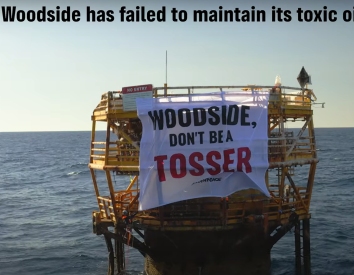Corruption at a Government level is preventing the switch to clean energy and the demise of the coal industry, writes David Ritter.
IF WE HEAR the phrase “criminal corruption in the coal industry”, we might assume that the problem is one of bags of cash being exchanged with officials for favourable treatment. And while there are various notorious examples of this sort of cash bribery occurring in relation to the coal industry, an even greater problem is the endemic institutional corruption.
Harvard Professor of Law Lawrence Lessig has defined institutional corruption as occurring:
...when there is a systemic and strategic influence which is legal, or even currently ethical, that undermines the institution’s effectiveness by diverting it from its purpose or weakening its ability to achieve its purpose, including, to the extent relevant to its purpose, weakening either the public’s trust in that institution or the institution’s inherent trustworthiness.
Applying Lessig’s thinking in Australia, the institution is our representative democracy, and the systemic influence comes from the coal corporations that undermine the Government’s effectiveness by diverting law and policy away from what is beneficial for everyone, to what suits the narrow vested interest of the coal bosses.
According to the best available science, we have to stop burning coal as fast as possible if we are to avoid catastrophic runaway global heating. Fortunately, this is possible, because renewable energy is now both cheaper and more reliable than dirty old fossil fuels. Coal-fired power is now old technology. Wanting to keep using coal instead of switching to smart, clean energy is every bit as nuts as insisting that you want to keep a pot under your bed rather than installing a flushing toilet.
The only reason why Australia is not making the rapid transition from dirty, dangerous coal to smart, clean energy is the institutional corruption of our democracy by the fossil fuel industry. As former Prime Minister Kevin Rudd noted last week, it is clear big polluters have run “sophisticated political operations” to thwart action on climate change.In the face of the climate emergency, every politician must now ask themselves the same question: will they stand up to the coal, oil and gas companies on behalf of the community, or will they give in to institutional corruption? There is no third choice.
Two recent examples show this institutional corruption at work. There is no suggestion of any illegality at work in Queensland Premier Annastacia Palaszczuk’s rushing of Adani approvals a few days after the Federal Election. But within Lessig’s framework, what occurred was a clear weakening of government in the public interest in order to suit the preferences of the coal sector.
The national poll result had literally nothing to do with any objective test of whether Adani could draw down unlimited water from the Galilee Basin without causing lasting damage, or whether the threatened black-throated finch could be safeguarded by Adani’s development plan. Palaszczuk was simply “fed up” with the time taken by public servants to follow due process and was herself “focusing on jobs”.
The malign influence of the coal sector was also on show recently in New South Wales, when the Independent Planning Commission (IPC) handed down its decision that the proposed Kepco Bylong mine could not go ahead, citing unacceptable impacts on groundwater, strategic agricultural land and local heritage values, as well as the mine’s impact on climate change and intergenerational equity.
Instead of accepting the umpire’s impartial ruling, the coal corporations went on the attack, with the NSW Minerals Council launching a coordinated assault on the regulator for doing its statutory job. Under this pressure, the NSW Government is now considering bringing new laws to prevent courts and planners from blocking coal mines on climate grounds. In the face of the climate emergency, this is like saying you are considering banning fire engines because you don't want to inconvenience the arsonists. Such proposed new laws would, in effect, be a form of legislated denial.
It is ironic that the reason why decisions on coal approvals went to an independent planning commission authority in the first place is because of the findings of former judge and ex-ICAC Commissioner David Ipp QC, which highlighted major policy and regulatory problems in the regulation of the state's coal industry.
As it stands, the public interest is not adequately considered under Australian mining law. Our regulatory frameworks are stacked against people, and in favour of the coal and gas companies. Governments everywhere should be looking to greatly strengthen environmental and community protections rather than pulling apart the limited measures which currently exist.
It is time to call a halt on the institutional corruption of the coal industry. The future of our kids and our country depend on it. Enough is enough.
David Ritter is CEO of Greenpeace Australia Pacific, adjunct professor at Sydney University and an honorary fellow of the Law Faculty at the University of Western Australia. You can follow David Ritter on Twitter @David_Ritter.
 This work is licensed under a Creative Commons Attribution-NonCommercial-NoDerivs 3.0 Australia License
This work is licensed under a Creative Commons Attribution-NonCommercial-NoDerivs 3.0 Australia License
Support independent journalism Subscribe to IA.












